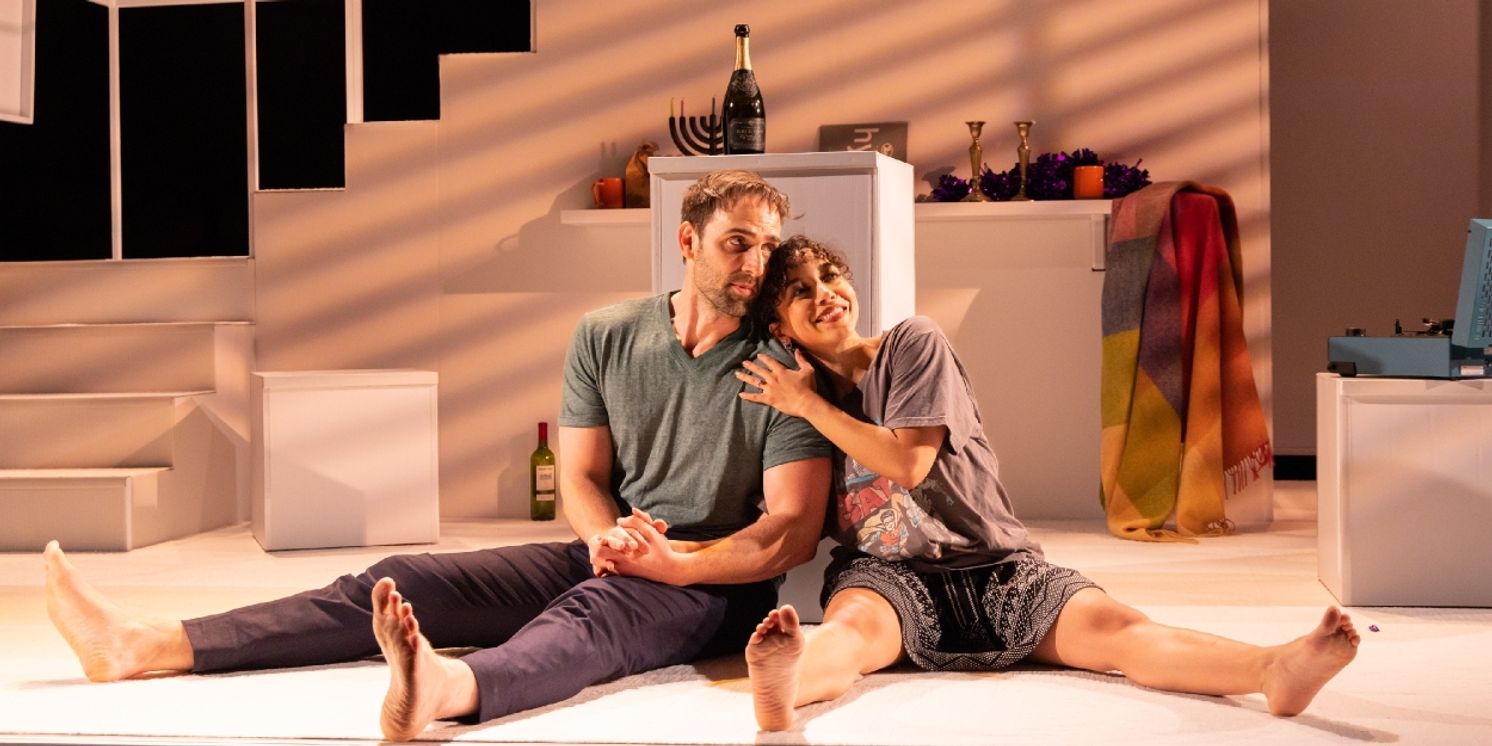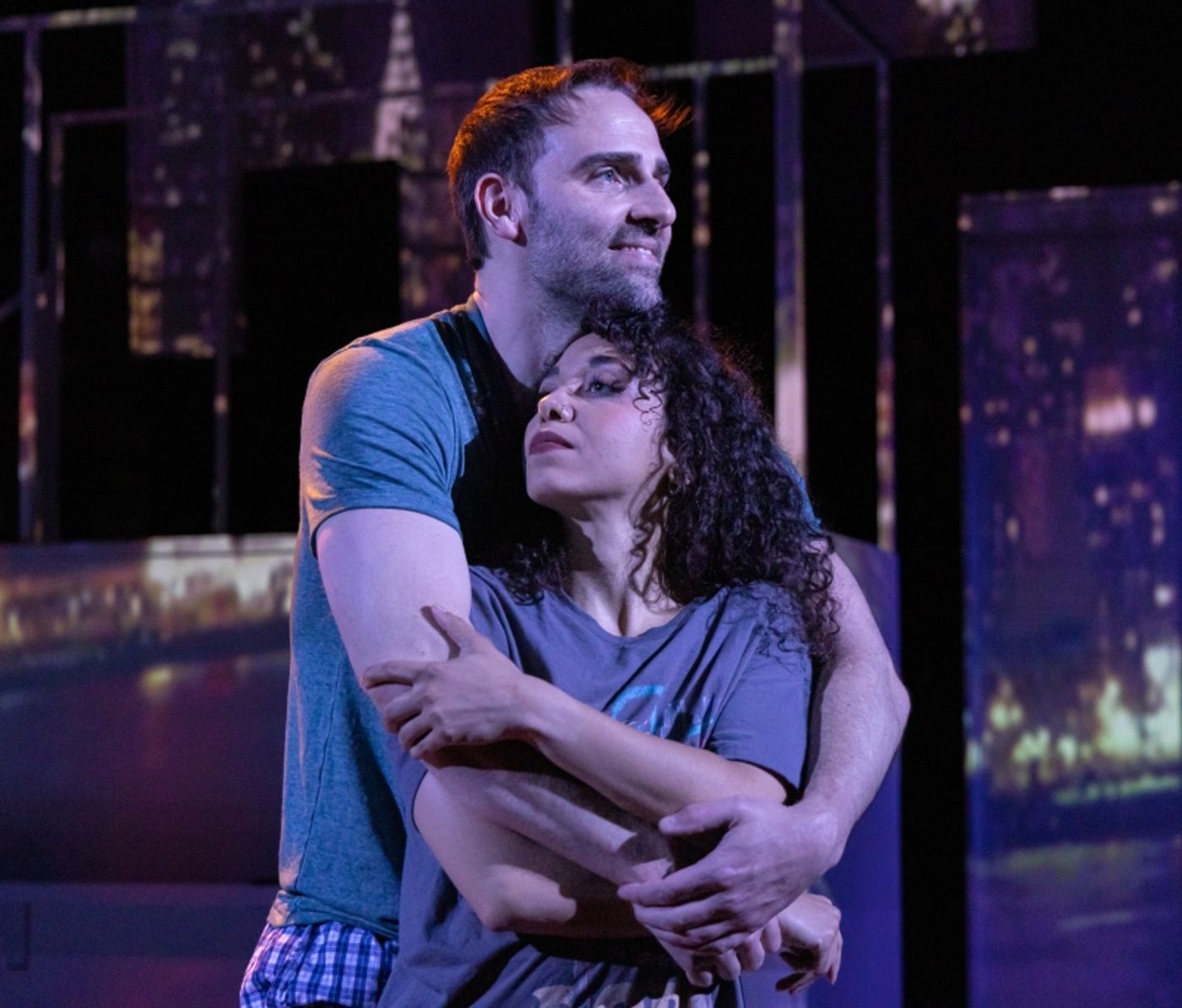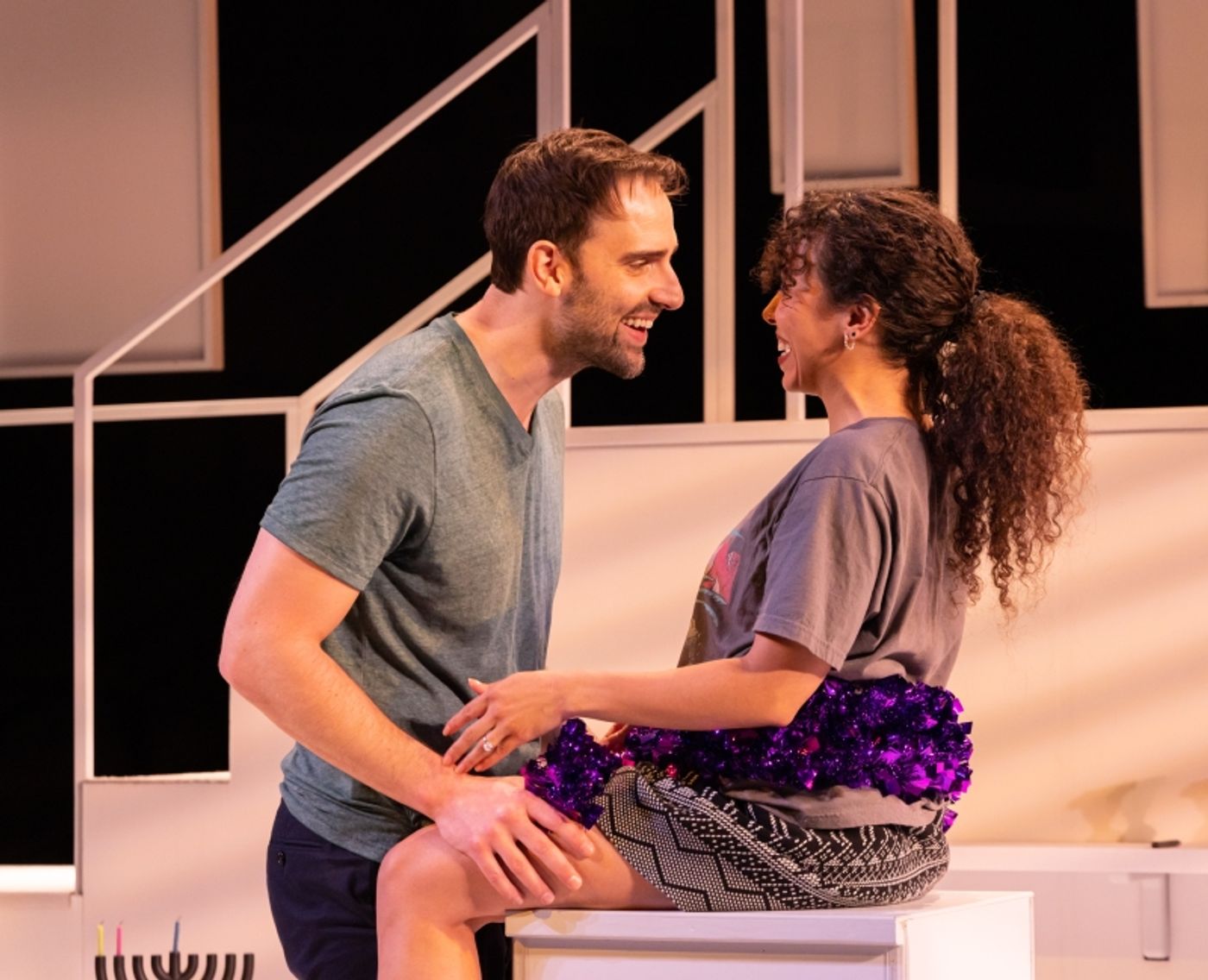Review: ONE JEWISH BOY at Theater J
Theater J hosts the US premiere of Stephen Laughton's powerful play about the impact of hatred on love

“We literally spend our whole lives working around this one thing that happened to you.”
There are many reasons a relationship succeeds or fails. People are complex, and our interactions are even more so. That’s part of why theater often examines the relationships we forge – there are endless possibilities to explore, and they’ll each connect with the audience and even the creative teams behind them in different ways.
But no relationship can exist in a vacuum, and the world around us will always have an influence on who we are and how we relate to others. And sometimes, no matter how much we wish otherwise, our experiences have a profound impact on our relationships, not always for the best.
Stephen Laughton’s beautifully moving One Jewish Boy tells the heartbreaking story of a couple’s relationship, and examines the impact of trauma and the different ways we process it. The play follows Jesse, a university professor, and his partner, Alex, a music producer, through their tumultuous relationship over the years – from their sweet beginning to their breakdowns to their parting ways. Laughton opts to show their relationship in a nonlinear fashion, giving the audience quick snapshots into different phases of their lives – some good, some bad, some painful. Compounding and often causing their turmoil are their very different backgrounds: Jesse is an Ashkenazi Jewish man from an upper middle-class neighborhood, while Alex is a mixed-race woman from a humbler upbringing. Their divergent pasts and identities both bring them closer together and drive them apart – they both understand what it’s like to navigate the world as a minority, and they have both faced bigotry as they move through the world. They have numerous discussions about how the other “gets” their experience because of these similarities, but their experiences aren’t always aligned, and where they diverge can be more divisive than bridging, especially since they each approach generational trauma and its impacts in radically different ways. When Jesse is attacked for being Jewish, it sparks a trauma response that leads to him feeling more fearful and isolated while also digging deeper into his Jewish identity, a response that Alex, used to navigating the press of racism and sexism in the world, can’t comprehend.

What is perhaps most striking is that the two consistently show empathy for each other’s experiences, but not sympathy for their way of coping – they can relate to what’s hurting, but they can’t fathom how the other processes it, and their profoundly different responses leave no room for the other, ultimately driving them apart. Jesse’s vigilance is his way of managing his changed world, but Alex has spent her whole life refusing to bend to the vitriol and systemic disadvantages put on her as a woman of color; not only can they fail to understand the other’s reaction, the differences are fundamental to who they are and how they move through the world. It’s heartbreaking to watch their doomed relationship play out, knowing from the outside that they simply can’t comprehend something so intrinsic to the other because it would unravel their own selves. But Laughton’s brilliant script goes a step further from laying out this complex devastation – it also manages to be profound, funny, and clever. Even with such a difficult focus – the impact of hatred on our relationships – the play is charming and engaging, and evokes a stunning mixture of emotions. The love Alex and Jesse share is genuine, which makes their separation all the more tragic, and Laughton captures the moments of joy and cohesion with the same deftness as the arguments that drive them apart.
It helps that the team bringing this production to life for its American debut is formidable. Helming the show is Johanna Gruenhut, whose direction and vision enhance the stirring script. Under Gruenhut’s supervision, the play comes to life in a breathtaking way, and it’s clear she’s invested in the story – an investment that easily carries to the audience. This is further helped by the excellent casting of Danny Gavigan as Jesse and Alanna Saunders as Alex, both clear coups for Casting Director Elizabeth Hay. Individually, the actors are incredible forces – Gavigan brings an impressive array of emotions as Jesse, capturing both his lighthearted moments and the ones where his PTSD rears its head, and Saunders brings an equally nuanced approach to Alex’s joy, despair, and exasperation. Together, though, the two are electric. The chemistry between the actors as they bounce off each other is palpable, and their synchronicity helps them shift seamlessly from joyous moments dancing or discussing their future together to passionate embraces to vitriolic arguments. In a character-driven piece like this, casting is imperative, and it’s safe to say that Gavigan and Saunders do an exquisite job of capturing such a sensitive array of subjects and emotions both believably and beautifully. The two are so convincing, it hurts the heart to believe that their characters can’t make their relationship work – it’s impossible not to be invested in them.

This impressive display of talent isn’t just confined to the cast, but also extends to Theater J’s solid production team. As is the case with Gruenhut’s direction, the production elements of this show are fantastic. Debra Kim Sivigny’s minimalist and stark black-and-white set is versatile and adapts easily to the changing scenes in Alex and Jesse’s lives, and is a great backdrop to Danny Debner’s fitting projections, which portray both the different points in the characters’ lives and Jesse’s PTSD flashbacks. Jesse W. Belsky’s lighting design is solid, as are Matthew M. Nielson’s sound design and compositions for the show, especially highlighting Alex’s love for music and heightening the tenser moments. Pamela Weiner’s carefully selected props do a great job of grounding the scenes, and Danielle Preston’s costumes help set both the time period and characters’ life stages, plus they were versatile enough to accommodate the quick changes often needed between scenes (some of those changes felt particularly cleverly staged as well). Given that the show centers around two actors walking through the ins and outs of the relationship, Cliff Williams III had a monumental task as Violence and Intimacy Coordinator, but the end result is so smooth and lyrical, there are moments when the actors’ movements almost feel like a dance. Dialect Coach Tonya Beckman equally rose to the challenge of this production, helping the two American actors adopt accents that fit their characters down to their neighborhood and social class, picking up on the subtleties that clearly defined each character and reflected the care that shines through in every element of this production.
At a time when it feels like every perusal of the news reveals another example of hatred – rising antisemitism, pervasive racism, systemic sexism – it feels both grounding and disheartening to watch the impact of these forms of hatred on love. But there’s also something profoundly touching about watching people try to work through these issues, even if they don’t succeed. Despite the heartrending story the audience is shown, One Jewish Boy doesn’t leave the audience with a sense of despair, choosing to end on a positive moment for Alex and Jesse. Maybe that sweet moment makes the impact of hatred on them all the more tragic, but Laughton and the team at Theater J manage to infuse the production with a sense of hope rather than despair, a moment when two people choose each other, and it’s enough.
The American premiere of Stephen Laughton’s One Jewish Boy runs at Theater J through July 2nd. Information about tickets, cast and creative talkback sessions, and accessibility can be found on the Theater J website. Please note that this production contains depictions of assault, drug use, and hate speech. Performance run time is approximately 1 hour and 45 minutes with no intermission.
Reader Reviews
Videos

